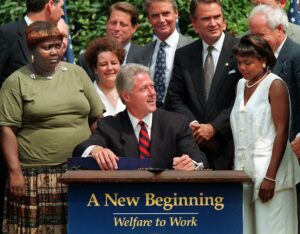Reconsidering Welfare Reform
 Twenty-five years ago this week, President Clinton signed “The Personal Responsibility and Work Opportunity Reconciliation Act” – better known as the Welfare Reform Act – into law. The bill was controversial at the time, especially among anti-poverty advocates who worried that the law’s impact on people living in poverty would be significant and significantly harmful.
Twenty-five years ago this week, President Clinton signed “The Personal Responsibility and Work Opportunity Reconciliation Act” – better known as the Welfare Reform Act – into law. The bill was controversial at the time, especially among anti-poverty advocates who worried that the law’s impact on people living in poverty would be significant and significantly harmful.
Turns out our fears were very much founded.
The results of the law have been devastating. Income inequality has grown exponentially in the last thirty years. According to the Center for Budget and Policy Priorities, “the best survey data show that the share of wealth held by the top 1 percent rose from 30 percent in 1989 to 39 percent in 2016, while the share held by the bottom 90 percent fell from 33 percent to 23 percent.” There are many structural reasons for the concentration of wealth, not the least of which is the fact that sometime in the 1970s, wages and productivity decoupled, meaning that while people were working longer hours, that hasn’t been reflected in their paycheck. But it’s also not difficult to imagine that our porous social safety net has also played a role.
As inequality becomes more prevalent in our society and poverty ever more punitive, we all realize that the time has come to rebuild our safety net. It’s time to reform welfare reform.
Limiting the social safety net and opportunities for economic improvement among families and individuals living in poverty was long a policy goal of conservative politicians, but it became a reality after the 1994 election when Newt Gingrich took over the role of Speaker of the House and Republicans gained control of the U.S. Senate. But this was a bipartisan policy disaster. President Clinton was facing reelection in 1996 and he signed the legislation on August 22nd of that year, just a few months before he was reelected to the presidency.
The idea at the time was to fund workforce development programs that would help move people from government assistance to self-sufficiency. But while Congress was eager to gut programs that directly helped people living in poverty, they never lived up to their promise to fully fund workforce development initiatives across the country. And unfortunately, subsequent Congresses and Presidents – both Republicans and Democrats – have also failed to live up to those commitments.
Both the Great Recession the country experienced in 2008 and the economic slowdown that the COVID-19 pandemic triggered in the last year and a half have shown us that constricting social programs to help families and individuals living in poverty do nothing to strengthen our society. The pandemic, in particular, has been especially cruel to those living in poverty. Many lost minimum wage jobs and those that didn’t were often forced to work in unsafe conditions that exacerbated the public health crisis. Others were faced with possible eviction – the state and federal moratoriums on housing evictions staved that off for a while but those moratoriums either have ended or will come to an end soon. Food insecurity, concerns about childcare, worries over how to pay for health care – all of these anxieties were further heightened by the pandemic.
The only good news to come from this situation is that as a society, we are finally waking up to the idea that the safety net fortifies all of us. Shortly after taking office, Congress passed and President Biden signed the American Rescue Plan Act (ARPA), which included important anti-poverty measures like the childcare tax credit expansion. Both President Biden’s budget and his infrastructure plans include proposals that will ease the burden of poverty on millions of Americans.
While not directly indicating that they are reversing the bad decisions made 25 years ago, leaders in Congress and the administration seem to be working hard to do so. But that is not enough – poverty in this country is structural and we can only end systemic poverty if we face those systems and reform them. Let’s end “welfare reform” and help people in poverty. We will likely never have a better time to do so.
